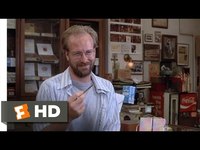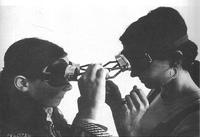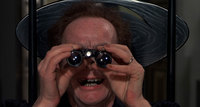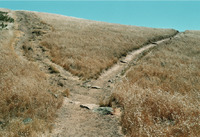Items
Site
The Medicine Chest
Is Part Of is exactly
Philosophy
-

Weighing Smoke
PAUL That’s the man. Well, Raleigh was the person who introduced tobacco in England, and since he was a favourite of the Queen’s – Queen Bess, he used to call her – smoking caught on as a fashion at court. I’m sure Old Bess must have shared a stogie or two with Sir Walter. Once, he made a bet with her that he could measure the weight of smoke. DENNIS You mean, weigh smoke? PAUL Exactly. Weigh smoke. TOMMY You can’t do that. It’s like weighing air. PAUL I admit it’s strange. Almost like weighing someone’s soul. But Sir Walter was a clever guy. First, he took an unsmoked cigar and put it on a balance and weighed it. Then he lit up and smoked the cigar, carefully tapping the ashes into the balance pan. When he was finished, he put the butt into the pan along with the ashes and weighed what was there. Then he subtracted that number from the original weight of the unsmoked cigar. The difference was the weight of the smoke. TOMMY Not bad. That’s the kind of guy we need to take over the Mets. PAUL Oh, he was smart, all right. But not so smart that he didn’t wind up having his head chopped off twenty years later. (Pause) But that’s another story. -

Dialogue goggles
-

Film still from Paolo Pasolini’s 'Salò'
A film still from Paolo Pasolini’s 'Salò, or the 120 days of Sodom' (1975), in which a protagonist turns his binoculars around to create distance between himself and the scene of torture playing out in the courtyard below. -

Door, 11 rue Larrey, New York.
-

Or
"The processes of digression and diversion have much in common with what the writer Ross Chambers (1999) calls ‘loiterature’. Chambers investigates the digressive, category-blurring genre of writing found in works such as Nicholson Baker’s 'The mezzanine', Paul Auster’s 'City of glass' and Laurence Sterne’s 'Tristam Shandy'. Loiterly writing, according to Chambers, disarms criticism by providing a moving target, shifting as its own divided attention constantly shifts. Criticism depends on the opportunity to discriminate and hierarchise, determining what is central and what is peripheral (Chambers 1999: 9), which this form eludes by resisting contextualisation or singular categorisation. Loiterature promotes sites of endless intersection, where attention is always divided between one thing and some other thing, always willing and able to be distracted, contrasting ‘the disciplined and the orderly, the hierarchical and the stable, the methodical and the systematic’ (Chambers 1999: 10). In contrast to methods of science that seek to stabilise objects within taxonomic systems or that require the formulation of hypotheses to provide direction for experimentation and a basis for concrete outcomes, the processes of curatorship and artmaking revel in rerouting and redirecting and in diversion and digression" (Liebenberg 2021: 286). -

Rede de elásticos (Elastic Net)
The Brazilian artist Lygia Clark (1920-1988) produced relational objects to be inhabited and activated by groups of people. Her net made up of elastic bands attached to each other, allows a complex structure, a complex grid, inviting a choreographed dance between strangers as they play with it by pushing and pulling these bands. -

Stevenson's fishing gear
A label accompanying Robert Louis Stevenson's fishing gear. -

The sea
"As I stood there, suddenly, no, not suddenly, but in a sort of driving heave, the whole sea surged, it was not a wave, but a smooth rolling swell that seemed to come up from the deeps, as if something vast down there had stirred itself, and I was lifted briefly and carried a little way toward toward the shore and then set down on my feet as before, as if nothing had happened. And indeed nothing had happened, a momentous nothing, just another of the great world's shrugs of indifferennce (Banville 2005: 26) -

Strange landscapes
In a short story by the writer Alice Munro titled, 'Walker Brothers Cowboy', a young girl joins her father, a fox farmer turned traveling salesman, on his visits to homes in the countryside where they live. After observing her father nearly getting doused with a chamber pot of urine by an unwelcoming customer, he veers off his usual rounds to visit a woman whom she slowly understands to be his sweetheart from when he was younger. Driving back home, she thinks about the events of the day: "So my father drives and my brother watches the road for rabbits and I feel my father's life flowing back from our car in the last of the afternoon, darkening and turning strange, like a landscape that has an enchantment on it, making it kindly, ordinary and familiar while you are looking at it, but changing it, once your back is turned, into something you will never know, with all kinds of weathers, and distances you cannot imagine. When we get closer to Tuppertown the sky becomes gently overcast, as always, nearly always, on summer evenings by the Lake" (Munro 2010: 23). -

A perfect day for bananafish
Extract from J.D. Salinger's 'For Esmé - With Love and Squalor' in which Seymour Glass interacts with a young girl while swimming in the ocean on holiday. “Miss Carpenter. Please. I know my business,” the young man said. “You just keep your eyes open for any bananafish. This is a perfect day for bananafish.” “I don’t see any,” Sybil said. “That’s understandable. Their habits are very peculiar.” He kept pushing the float. The water was not quite up to his chest. “They lead a very tragic life,” he said. “You know what they do, Sybil?” She shook her head. “Well, they swim into a hole where there’s a lot of bananas. They’re very ordinary-looking fish when they swim in. But once they get in, they behave like pigs. Why, I’ve known some bananafish to swim into a banana hole and eat as many as seventy-eight bananas.” He edged the float and its passenger a foot closer to the horizon. “Naturally, after that they’re so fat they can’t get out of the hole again. Can’t fit through the door.” “Not too far out,” Sybil said. “What happens to them?” “What happens to who?” “The bananafish.” “Oh, you mean after they eat so many bananas they can’t get out of the banana hole?” “Yes,” said Sybil. “Well, I hate to tell you, Sybil. They die.” “Why?” asked Sybil. “Well, they get banana fever. It’s a terrible disease.” “Here comes a wave,” Sybil said nervously. “We’ll ignore it. We’ll snub it,” said the young man. “Two snobs.” He took Sybil’s ankles in his hands and pressed down and forward. The float nosed over the top of the wave. The water soaked Sybil’s blond hair, but her scream was full of pleasure. With her hand, when the float was level again, she wiped away a flat, wet band of hair from her eyes, and reported, “I just saw one.” “Saw what, my love?” “A bananafish.” “My God, no!” said the young man. “Did he have any bananas in his mouth?” “Yes,” said Sybil. “Six.” The young man suddenly picked up one of Sybil’s wet feet, which were drooping over the end of the float, and kissed the arch. “Hey!” said the owner of the foot, turning around. “Hey, yourself! We’re going in now. You had enough?” “No!” “Sorry,” he said, and pushed the float toward shore until Sybil got off it. He carried it the rest of the way. (Salinger 1986: 20-21). -

Vatnajökull (the sound of)
A live phone line was created to an Icelandic glacier, via an underwater microphone submerged in Jökulsárlón lagoon, an outlet of Vatnajökull. The number 07757001122 could be called from any telephone in the world, and the listener would hear the sound of the glacier melting. -

Condensation Cube
"One of Hans Haacke’s earlier works. While over time the artist developed a critique of art as an institution and system, these early works focus on art in the sense of process and physical system. Interested in biology, ecology and cybernetics, in the mid-sixties Haacke was influenced by the ideas of Ludwig von Bertalanffy, especially those outlined in his General System Theory of 1968. For the Austrian biologist and philosopher, a living organism is an open system that continuously changes depending on its dialogue or interaction with the environment. Haacke’s early works, such as Condensation Cube, transpose this concept to the realm of art" (MACBA 2021). -

Echolocation (Part one)
In the spring of 1940, Steinbeck and his very close friend, biologist Ed Ricketts, chartered a boat and embarked on a month long marine specimen-collecting expedition in the Gulf of California, which resulted in their collaboration on a book, 'The Sea of Cortez'. Described as both a travelogue and biological record, it reveals the two men's philosophies: it dwells on the place of humans in the environment, the interconnection between single organisms and the larger ecosystem, and the themes of leaving and returning home. A number of ecological concerns, rare in 1940, are voiced, such as an imagined but horrific vision of the long term damage that the Japanese bottom fishing trawlers are doing to the sea bed. Although written as if it were the journal kept by Steinbeck during the voyage, the book is to some extent a work of fiction: the journals are not Steinbeck's, and his wife, who had accompanied him on the trip, is not mentioned (though at one point Steinbeck slips and mentions the matter of food for seven people). Since returning home is a theme throughout the narrative, the inclusion of his wife, a symbol of home, would have dissipated the effect. Steinbeck and Ricketts are never mentioned by name but are amalgamated into the first person "we" who narrate the log. -

Echolocation (Part two)
"In Steinbeck’s 'Of Mice and Men', Crooks consoles the simple, unaffected and kindly Lennie when his friend, George, doesn’t return from town. He tells him he should be glad that he at least has someone. 'S’pose you didn’t have nobody. S’pose you couldn’t get into the bunk-house and play rummy ‘cause you was black. How’d you like that? (…) A guy sits alone out here at night, maybe readin’ books or thinkin’ or stuff like that. Sometimes he gets thinkin’ an’ he got nothing to tell him what’s so an’ what ain’t so. Maybe if he sees somethin’, he don’t know whether it’s right or not. He can’t turn to some other guy and ast him if he sees it too. He can’t tell. He got nothing to measure by. I seen things out here. I wasn’t drunk. I don’t know if I was asleep. If some guy was with me, he could tell me I was asleep, an’ then it would be alright. But I jus’ don’t know' "(Steinbeck 1973:62 in Liebenberg 2011: 102). -

"I wonder if it remembers me..."
In Wes Anderson’s 2004 film, 'The Life Aquatic with Steve Zissou', Bill Murray plays the part of eccentric oceanographer, Steve Zissou. Zissou is both a parody of and homage to Jacques-Yves Cousteau, to whom the film is dedicated. The characters were inspired by The Great Gatsby and The Magnificent Ambersons, whilst the plot has been compared to Moby Dick. While filming a documentary, Steve’s partner Esteban du Plantier is eaten by a creature Zissou describes as a “Jaguar shark.” For his next project, Zissou orchestrates documenting the shark’s destruction. -

The Jaguar Shark
In Wes Anderson’s 2004 film, 'The Life Aquatic with Steve Zissou', Bill Murray plays the part of eccentric oceanographer, Steve Zissou. Zissou is both a parody of and homage to Jacques-Yves Cousteau, to whom the film is dedicated. The characters were inspired by The Great Gatsby and The Magnificent Ambersons, whilst the plot has been compared to Moby Dick. While filming a documentary, Steve’s partner and close friend, Esteban du Plantier, is eaten by a creature Zissou describes as a “Jaguar shark.” For his next project, Zissou orchestrates documenting the shark’s destruction. -

"I've decided to stop pitying myself"
“Her purse is half open, and I see a hotel room key, a metro ticket, and a hundred-franc note folded in four, like objects brought back by a space probe sent to earth to study how earthlings live, travel, and trade with one another. The sight leaves me pensive and confused. Does the cosmos contain keys for opening up my diving bell? A subway line with no terminus? A currency strong enough to buy my freedom back? We must keep looking. I'll be off now". An extract from Jean-Dominique Bauby's 'The Diving Bell and the Butterfly', the memoir which he dictated after suffering a stroke in 1995. The stroke rendered him mute and almost completely paralyzed, except for the movement of his left eyelid. Bauby dictated his memoir through blinking as his speech therapist listed the letters of the alphabet. When his doctor told him his prognosis, he mentioned that in the past , he would have simply died from this type of stroke, but that improved resuscitation techniques had now prolonged and refined the agony of this condition: "You survive, but you survive with what is so aptly known as 'locked-in syndrome'”.


